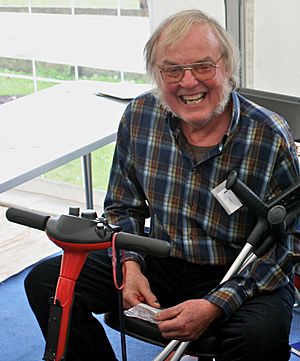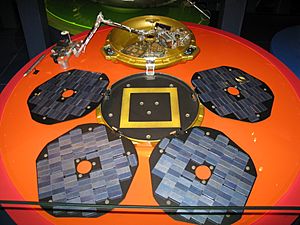Colin Pillinger facts for kids
Quick facts for kids
Colin Pillinger
|
|
|---|---|

At Jodrell Bank Observatory in 2009
|
|
| Born | 9 May 1943 Kingswood, Gloucestershire, England
|
| Died | 7 May 2014 (aged 70) Cambridge, UK
|
| Alma mater | University College of Swansea |
| Known for | Failure of Beagle 2 Mars lander Analyzing Apollo lunar samples |
| Awards | Michael Faraday Prize (2011) |
| Scientific career | |
| Fields | Planetary science |
| Institutions | Open University University of Cambridge |
Colin Trevor Pillinger (9 May 1943 – 7 May 2014) was a famous English scientist who studied planets. He was a key person at the Planetary and Space Sciences Research Institute at the Open University. He also led the British Beagle 2 project, which was a lander sent to Mars. Colin Pillinger also studied rocks from Mars called Martian meteorites.
Contents
Early Life and Education
Colin Pillinger was born on May 9, 1943, in Kingswood, South Gloucestershire, near Bristol. His father, Alfred, worked for the Gas Board. His mother was Florence. Colin went to Kingswood Grammar School. Later, he earned a Bachelor of Science (BSc) and a Doctor of Philosophy (Ph.D.) in Chemistry from Swansea University. He once joked that he was "a disaster as a science student."
Colin Pillinger's Amazing Career
After finishing university, Colin Pillinger worked at Cambridge University in the Earth Science Department. Then, he became a Senior Research Fellow at the Open University from 1984 to 1990. In 1991, he became a Professor of Interplanetary Science at the Open University.
One of his first jobs was with NASA. He helped with the Apollo space program and the European Space Agency's (ESA) Rosetta mission. He even studied the moon rocks brought back by the Apollo 11 astronauts.
Between 1996 and 2000, Professor Pillinger was the Gresham Professor of Astronomy at Gresham College. This was a special job once held by famous people like Sir Christopher Wren. Colin Pillinger felt a connection to these early professors. He said he wanted to share the story of life and the solar system in a way that everyone could understand.
Colin Pillinger was very good at making people excited about space science, especially in Britain. He helped train many experts in the field. He also brought together space scientists and companies in the UK.
In 2000, an asteroid in space was named 15614 Pillinger after him. This was a great honor! In 2003, he received the CBE award from the Queen. This was for his work in education and science.
Professor Pillinger also played a part in the Philae lander. This lander was part of the Rosetta mission. The Rosetta mission successfully met up with comet 67P/Churyumov–Gerasimenko in 2014. Colin Pillinger strongly believed that the Philae lander should land on the comet to do science experiments. He helped make sure the Ptolemy device, a science tool, was included.
Personal Life
Colin Pillinger's wife, Judith, is also a scientist. They met while working in the same lab. They had two children, a son named Nicolas Joseph and a daughter named Shusanah Jane. In 2015, Shusanah became the first British woman to finish the Race Across America, a very long bike race.
In May 2005, Colin Pillinger was diagnosed with multiple sclerosis. This illness made it hard for him to walk. He owned a dairy farm, but his illness stopped him from doing physical work there. Colin Pillinger passed away on May 7, 2014, in Cambridge, just two days before his 71st birthday.
Colin Pillinger in Popular Culture
Colin Pillinger's work and the Beagle 2 mission have appeared in popular culture.
- The Beagle 2 was mentioned in the Hollywood film Transformers: The Movie.
- His work on asteroid impacts was referenced in Jurassic Park.
- A missing British Mars spacecraft was part of the 2005 Doctor Who Christmas Special.
- Colin Pillinger appeared on the TV show Top Gear and won a contest.
- Beagle 2 was featured in a science fiction story by Stephen Baxter.
- It was also a subject in the book The Backroom Boys by Frances Spufford.
- His studies on Martian meteorites might have inspired the bestselling book Deception Point by Dan Brown.
Awards and Achievements
Here are some of Colin Pillinger's important qualifications, jobs, and awards:
- 1965: Earned his B.Sc (Chemistry) from Swansea University
- 1968: Earned his Ph.D (Chemistry) from Swansea University
- 1968: Became a Post-doctoral fellow at the University of Bristol Department of Chemistry
- 1974: Became a Research Associate at Cambridge University
- 1976: Became a Senior Research Associate at the Department of Earth Sciences, University of Cambridge
- 1981: Became a Fellow of the Royal Astronomical Society
- 1981: Became a Member of the British Mass Spectrometry Society
- 1984: Received an Honorary D.Sc (Chemistry) from the University of Bristol
- 1984: Became a Senior Research Fellow at the Department of Earth Science, Open University
- 1986: Became a Fellow of the Meteoritical Society
- 1991: Appointed Professor of Planetary Sciences at the Open University
- 1993: Became a Member of the International Astronomical Union
- 1993: Became a Fellow of the Royal Geographical Society
- 1993: Elected a Fellow of the Royal Society
- 1996: Became Professor of Astronomy at Gresham College in the City of London (until 2000)
- 2000: Main belt asteroid 15614 Pillinger was named after him.
- 2003: Received the Aston Medal
- 2003: Awarded a CBE
- 2011: Received the Michael Faraday Prize
 | Frances Mary Albrier |
 | Whitney Young |
 | Muhammad Ali |


